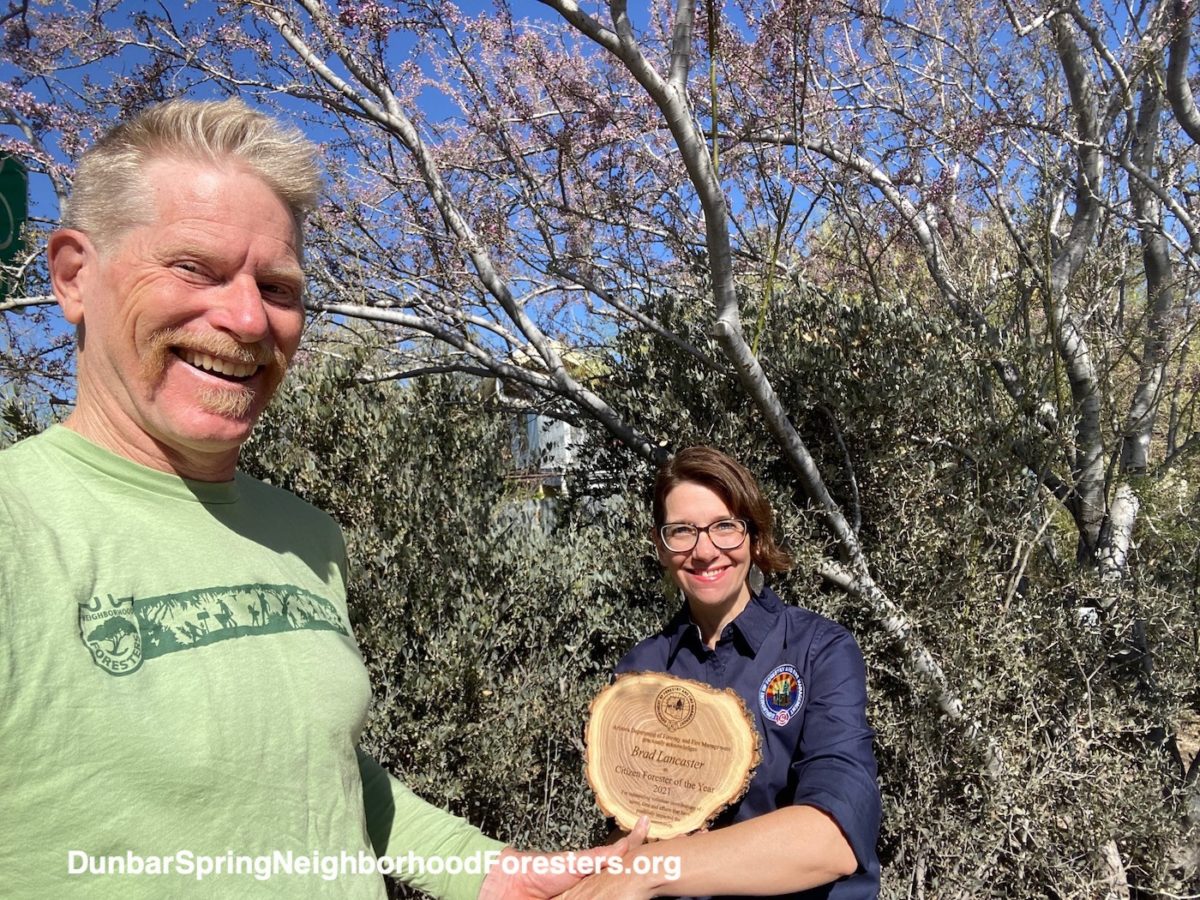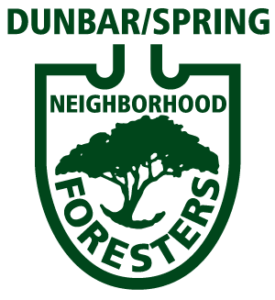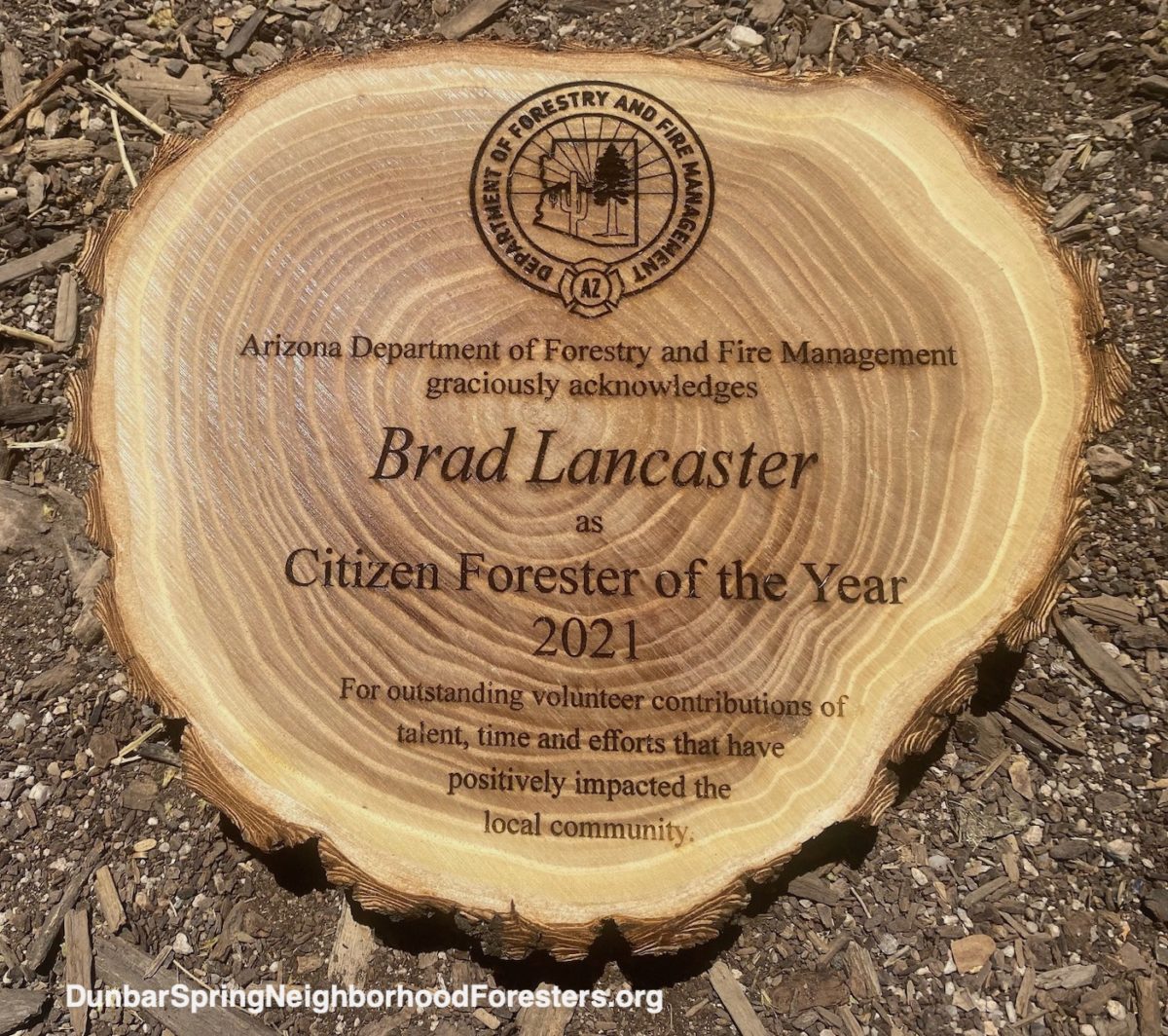The Arizona Department of Forestry and Fire Management awarded Brad Lancaster, co-founder of the Dunbar/Spring Neighborhood Foresters, with the 2021 Citizen Forester of the Year.

The following is Brad’s acceptance speech given at the State of Arizona’s 2021 Arbor Day Celebration:
Many thanks for this award and all those who have contributed over the years to our community forestry endevours.
Here is a brief description of some of what I, and the many I collaborate with, have and continue to do:
Our Neighborhood Foresters effort began in 1996 when I got a $1,000 Community Challenge grant to provide over 200 free native trees for a planting by community volunteers I coordinated in the Dunbar/Spring Neighborhood north of downtown Tucson.
We focused the vast majority of those food-bearing plantings in the public rights-of-ways along and within our streets so everyone could enjoy them.
This began a more than two-decade effort to transform a heat-island poster-child of a neighborhood and its largely treeless, public rights-of-ways of neglected public walkways, street sides, park, and other community space into some of Tucson’s greenest.
The planting became an annual event that continues to this day and has spread to adjoining neighborhoods.
Since 1996, I’ve coordinated countless volunteers, and worked with the City of Tucson, Pima County, certified arborists, Trees for Tucson, the Dunbar Coalition, and other non-profits to plant an additional 1,400 native trees and thousands of multi-use native understory plantings – all watered by passive water-harvesting earthworks/green infrastructure/rain gardens — that harvest over one-million gallons of stormwater per year that used to wastefully drain away.
We plant the rain BEFORE we plant any plants so free on-site waters can water our plantings in a way that leads to the recharge and renewal of our ground and surface waters, rather than their extraction.
We plant Tucson Basin native plants because they are the best adapted to our climate, soils, and wildlife.
Plant a non-native mesquite and you’ll support about a dozen species of native pollinators.
Plant a native mesquite and you’ll support over sixty species of native pollinators.
We don’t just plant trees. We also plant native understory plants and seed to maximize layers of life – tree canopy, vines, shrubs, ground covers, tubers, woody perennials, annual wildflowers, fruiting cacti, and more.
This has brought a lot more native wildlife back into our community, and also gets people outside and interacting because we prioritize native plants that produce food, medicine, craft/building materials, livestock fodder and more.
Thus both migrating bird life and snacking neighbors hang out in our forest.
This also invites us to connect and collaborate with the rich cultural and ecological heritage of this place, because we draw on the deep ethnobotanical knowledge of many peoples that have long called this place home to inform what multi-service indigenous plants we propagate and plant.
Such knowledge also informed Desert Harvesters a non-profit Brad co-founded in 2003 (and from which he resigned in 2020) that organized annual mesquite harvesting workshops, mesquite pod millings, and native food fiestas in the Dunbar/Spring neighborhood, EXO Roast, Tucson Community Food Bank Santa Cruz River Farmers Market, and Las Milpitas Community Farm in Tucson, Arizona.
As we continue with rain-irrigated native neighborhood food forestry, we call ourselves Neighborhood Foresters because we strive to enable the people living, working, and playing in the forests we plant to be the very growers and stewards of these forests.
The idea is to empower those that are most likely to love the forest – the forest they live within and interact with daily.
So, we organize events to increase the conscious interaction with the forests.
These include:
• Plantings
• Pruning & mulching workshops
• Stewarding parties
• Pathway access enhancements
• Installations of multi-lingual plant identification signs
• Harvests of native foods and medicines
• Processing parties and feasts of those foods
• Backyard plant nurseries, plant sales, and plant exchanges
All open to anyone from any neighborhood – because we want, and support, the generation of neighborhood forester groups in every neighborhood.
For more go to:
DunbarSpringNeighborhoodForesters.org
and
HarvestingRainwater.com

